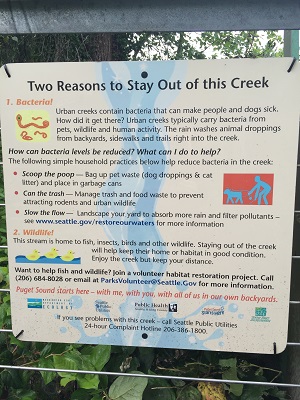Reducing Rules By Providing Reasons
by Kathy Slattengren, M. Ed., Priceless Parenting (sign up for monthly parenting newsletter and receive 20+ printable charts for kids and parents)

Have you ever told your kids not to touch something only to have them immediately try touching it? Being told not to do something naturally makes kids curious about what will happen if they do it.
If you were walking in a park on a warm summer day near a sparkling stream, would you or your kids be tempted to cool off in the stream? Splashing around in some cool water on a hot day feels great!
What if there was a sign nearby saying “Stay Out Of The Creek”? Would that make you stay on the path or would you feel even more drawn to the water? Simply being told not to do something can make the forbidden even more tempting. You can probably come up with many justifications for ignoring the sign and going into the creek. Perhaps you will go a little ways downstream from the sign so as not to break the rules right in front of the sign!
Providing Two Good Reasons
A neighborhood Seattle park has a beautiful creek flowing through it. There is a bridge over the creek and a dirt area near one side of the bridge which provides easy access to the creek.
Instead of telling people to stay out of the creek, the park service put up a sign providing valuable information about the creek. The sign’s title is “Two Reasons to Stay Out of this Creek”.
The first reason listed is bacteria. It states “Urban creeks contain bacteria that can make people and dogs sick.” It goes on to explain how bacteria gets into the creek and what you can do to reduce the bacteria in the creek. Excellent points … the last thing you want is to be sick!
The second reason listed is wildlife. “This creek is home to fish, insects, birds and other wildlife. Staying out of the creek will help keep their home or habitat in good condition.” This appeals to your desire to help protect the environment.
Reasons That Work Well
In the creek situation, the first reason was how your choice might affect you. You might get sick if you go in the creek. The second reason explained how your choice might affect others like the animals.
How could this apply to parenting situations? It’s more powerful to explain possible consequences of choices to your kids rather than to tell them what to do.
For example, instead of telling your kids not to use drugs, tell them what is likely to happen to their brains and bodies if they use drugs. My kids were horrified when they saw pictures of people who had been doing meth for a couple years. Their teeth were black and rotten. Their faces were sunken with sores all over. This left a huge impression on them!
You could also tell them how a choice to use drugs is likely to affect others. Kids who use drugs need money for those drugs and often turn to stealing to get that money. Family members may no longer feel comfortable having those kids over to their house due to having things stolen.
Whenever possible use real stories to highlight the consequences of choices. You can use stories from your family and friends or news stories.
Another example is when you take young kids to the store. Instead of telling them to stay right by you explain why keeping close to you is in their best interest. You might mention that they will feel scared if they can’t find you and that you would feel worried too.
It would also be good to tell them what to do in the unfortunate case that you do get separated. Teach your kids how to identify safe adults to ask for help.
Making Your Job Easier
You might think that you should not have to explain your reasoning to your kids. If you give them an order, than they should obey – no questions asked. However, when you give your kids orders and rules, you are doing the thinking instead of them. What happens when you are not around to give the orders or ensure the rules are followed?
Help your kids consider the consequences of their choices. This information will empower them to make wise choices not simply obey rules. When you can count on your kids making wise decisions on their own, your parenting job is so much easier!